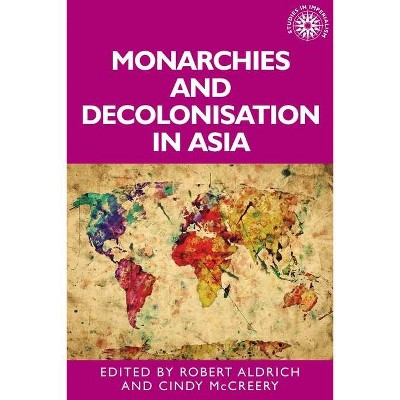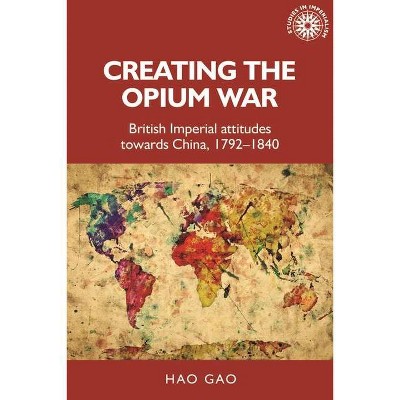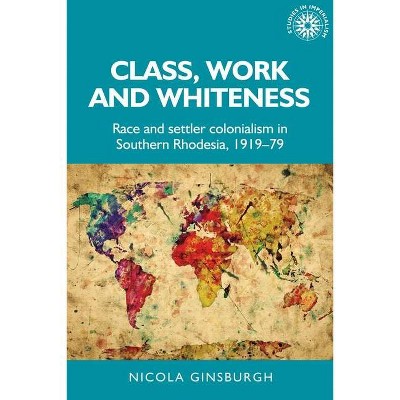Banished Potentates - (Studies in Imperialism) by Robert Aldrich (Hardcover)

Similar Products
Product info
<p/><br></br><p><b> About the Book </b></p></br></br>An examination of British and French deposition and exile of indigenous monarchs in Asia and Africa from 1815 until the 1950s.<p/><br></br><p><b> Book Synopsis </b></p></br></br><p>The deposition and exile of native monarchs was a key strategy in British and French efforts to secure control over their possessions in Asia and Africa. Taken as prisoners of war, implicated in rebellions or charged with misgovernment or immorality, indigenous rulers were dethroned and their dynasties sometimes abolished. They were then banished to distant places, in hopes they could not escape or serve as rallying-points for anti-colonial agitation. <br /> <br /> This wide-ranging study offers new insights into culture contact, indirect rule and indigenous agency in colonial situations. It examines the particular circumstances for the ouster of Asian and African emperors, kings and queens, maharajas and sultans. It looks at the often poignant lived experiences of the deposed rulers and their families in exile, assessing their later place in historical narrative and collective memory. Finally, it argues that even when colonisers 'kicked out' local sovereigns, they could not fully efface the potency of monarchism in national identity, anti-colonial campaigns and the heritage exiles left behind. Case studies range from the removal of the King of Kandy in Ceylon in 1815 - toppled and exiled just months after Napoleon was sent to St Helena - to the removal and restoration of King Mutesa of Uganda and Sultan Mohammed of Morocco in the 1950s. <br /> <br /> Appealing to specialists of colonial history, transnational history and the history of modern monarchy, <em>Banished potentates</em> provides a fascinating account of the exercise of imperial power, the paradoxes of royal exile and the legacies of indigenous dynasties.</p><p/><br></br><p><b> From the Back Cover </b></p></br></br>The deposition and exile of native monarchs was a key strategy in British and French efforts to secure control over their possessions in Asia and Africa. Taken as prisoners of war, implicated in rebellions or charged with misgovernment or immorality, indigenous rulers were dethroned and their dynasties sometimes abolished. They were then banished to distant places, in hopes they could not escape or serve as rallying-points for anti-colonial agitation. This wide-ranging study offers new insights into culture contact, indirect rule and indigenous agency in colonial situations. It examines the particular circumstances for the ouster of Asian and African emperors, kings and queens, maharajas and sultans. It looks at the often poignant lived experiences of the deposed rulers and their families in exile, assessing their later place in historical narrative and collective memory. Finally, it argues that even when colonisers 'kicked out' local sovereigns, they could not fully efface the potency of monarchism in national identity, anti-colonial campaigns and the heritage exiles left behind. Case studies range from the removal of the King of Kandy in Ceylon in 1815 - toppled and exiled just months after Napoleon was sent to St Helena - to the removal and restoration of King Mutesa of Uganda and Sultan Mohammed of Morocco in the 1950s. Appealing to specialists of colonial history, transnational history and the history of modern monarchy, <i>Banished potentates</i> provides a fascinating account of the exercise of imperial power, the paradoxes of royal exile and the legacies of indigenous dynasties.<p/><br></br><p><b> Review Quotes </b></p></br></br><br>'The book is particularly inspiring ... in that it takes the institution of monarchy with all its ceremonies, backgrounds, political-religious ideas, and contexts seriously, even in a time of (supposedly) anti-monarchical nationalism, colonialism, and modernity. This study shows once again how influential monarchical ideas and conventions remained after the French Revolution.' Cathleen Sarti, Royal Studies Journal 'It is always a pleasure to write a review on a book that is so easily readable and really adds to one's own knowledge in a significant manner. [...] The book is particularly inspiring--from the perspective of a pre-modern royal studies scholar--in that it takes the institution of monarchy with all its ceremonies, backgrounds, political-religious ideas, and contexts seriously, even in a time of (supposedly) anti-monarchical nationalism, colonialism, and modernity. This study shows once again how influential monarchical ideas and conventions remained after the French Revolution.' Cathleen Sarti, Royal Studies Journal<br><p/><br></br><p><b> About the Author </b></p></br></br><br><strong>Robert Aldrich</strong> is Professor of European History at the University of Sydney<br>
Price History
Price Archive shows prices from various stores, lets you see history and find the cheapest. There is no actual sale on the website. For all support, inquiry and suggestion messagescommunication@pricearchive.us








